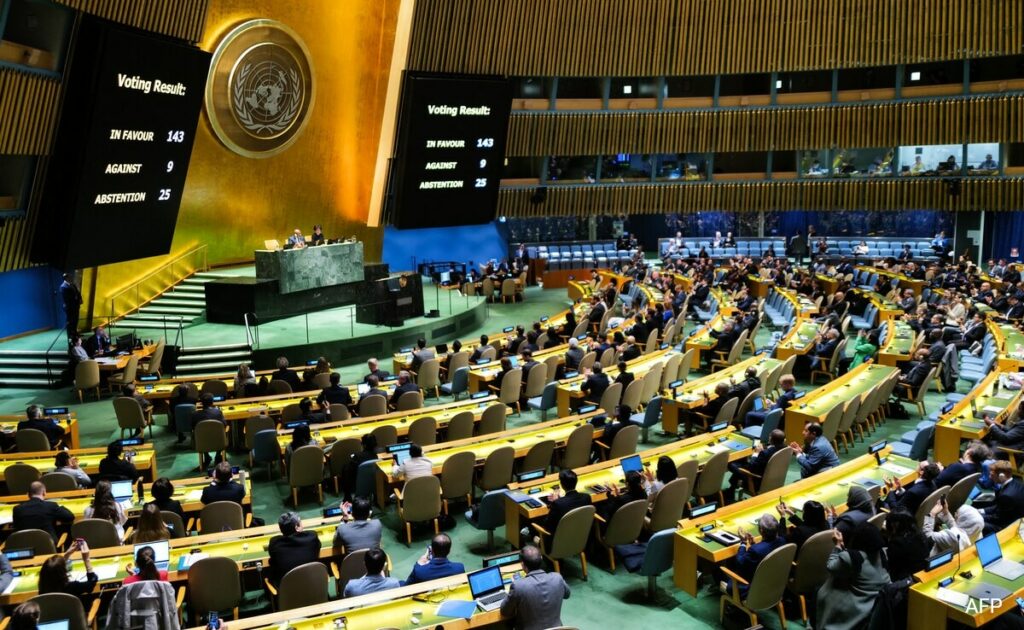India on Friday voted in favour of a draft UN General Assembly resolution that said Palestine is qualified and should be admitted as full member of the United Nations and recommended that the Security Council “reconsider” the matter “favourably”.
The 193-member General Assembly met in the morning for an emergency special session where the Arab Group resolution ‘Admission of new Members to the United Nations’, in support of the State of Palestine’s full membership in the UN, was presented by the United Arab Emirates, as Chair of the Arab Group in May.
The resolution got 143 votes in favour, including by India, nine against and 25 abstentions. The UNGA hall broke into an applause after the vote was cast.
The resolution determined that “the State of Palestine is qualified for membership in the United Nations” in accordance with Article 4 of the Charter of the United Nations and “should therefore be admitted to membership in the United Nations”.
It recommended that the Security Council “reconsider the matter favourably, in the light of this determination”.
India was the first non-Arab State to recognise the Palestine Liberation Organisation as the sole and legitimate representative of the Palestinian people in 1974. India was also one of the first countries to recognise the State of Palestine in 1988 and in 1996, Delhi opened its Representative Office to the Palestine Authority in Gaza, which was later shifted to Ramallah in 2003.
Earlier this month, India’s Permanent Representative to the UN Ambassador Ruchira Kamboj had said that while Palestine’s application for membership at the UN was not approved by the Security Council because of the veto in the UNSC, “I would like to state here at the very outset that in keeping with India’s long-standing position, we hope that this would be reconsidered in due course and that Palestine’s endeavour to become a member of the United Nations will get endorsed”.
An annex to the resolution said that the additional rights and privileges of participation of the State of Palestine will be effective as of the 79th session of the General Assembly that begins in September this year.
These include the right to be seated among member states in alphabetical order; the right to make statements on behalf of a group, including among representatives of major groups; the right of members of the delegation of the State of Palestine to be elected as officers in the plenary and the Main Committees of the General Assembly and the right to full and effective participation in UN conferences and international conferences and meetings convened under the auspices of the General Assembly.
Palestine, in its capacity as an observer state, does not have the right to vote in the General Assembly or to put forward its candidature to UN organs.
In April, Palestine had sent a letter to UN Secretary-General Antonio Guterres requesting that its application for full UN membership be considered again. For a state to be granted full UN membership, its application must be approved both by the Security Council and the General Assembly, where a two-thirds majority of the members present and voting is required for the state to be admitted as a full member.
Last month, the US had vetoed a resolution in the Security Council on the Palestinian bid to be granted full membership of the United Nations. The 15-nation Council had voted on a draft resolution that would have recommended to the 193-member UN General Assembly “that the State of Palestine be admitted to membership in the United Nations”.
The resolution got 12 votes in its favour, with Switzerland and the UK abstaining and the US casting its veto. To be adopted, the draft resolution required at least nine Council members voting in its favour, with no vetoes by any of its five permanent members – China, France, Russia, United Kingdom and United States.
Currently, Palestine is a “non-member observer state” at the UN, a status granted to it by the General Assembly in 2012. This status allows Palestine to participate in proceedings of the world body but it cannot vote on resolutions. The only other non-member observer state at the UN is the Holy See, representing the Vatican.
(Except for the headline, this story has not been edited by NDTV staff and is published from a syndicated feed.)

